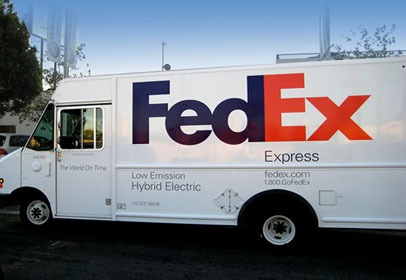Dear EarthTalk: What are the big delivery companies like FedEx and UPS doing to green their truck fleets and operations in general? – Mitchell Glaser,
Package delivery companies like FedEx and UPS have come a long way in improving the fuel efficiency of their worldwide fleet of delivery vehicles. Pictured: A FedEx hybrid electric delivery van.
Package delivery companies like FedEx and UPS have come a long way in a relatively short time regarding sustainability, but they still have considerable room for improvement. While there is only so much these companies can do to reduce their huge carbon footprints—given their reliance on emissions-heavy air transport—they’ve made great strides in greening their ground fleets, optimizing their choices of modes and otherwise streamlining energy use.
For its part, UPS was an early adopter of cleaner vehicles, and today operates upwards of 2,500 low-emission vehicles that run on alternative fuels and technologies. The company is particularly jazzed about a new generation of hydraulic hybrid package delivery trucks unveiled in the fall of 2012 in partnership with the U.S. Department of Energy’s Clean Cities program. These new trucks—which employ a diesel combustion engine along with a hydraulic high-pressure accumulator that stores energy captured during braking—get 35 percent better fuel economy and generate as much as 30 percent fewer greenhouse gas emissions as compared to the non-hybrid diesel-powered vehicles they are replacing. While these trucks may cost UPS $7,000 apiece more than their traditional counterparts, the company estimates the upgrade will save $50,000 or more, while substantially reducing emissions, over the lifetime of each vehicle.
UPS has also been blazing new trails in operational efficiency via intermodal shifting, e.g., using the most fuel-efficient transport mode (airplane, train, truck or ship) or combination of modes to meet customer needs. A concerted effort by the company to streamline its operations in 2011 led to savings of two million metric tons of greenhouse gas emissions by moving delivery volume from air (the most emissions-intensive mode by far) to ground, and another 800,000 metric tons by shifting volume from ground to rail.
Meanwhile, FedEx, with one of the largest hybrid-electric fleets in the industry and upwards of 2,000 alternative energy vehicles in service worldwide, is no slouch either when it comes to green streamlining. Back in 2008 the company worked with the Environmental Defense Fund (EDF) in setting the ambitious goal of improving the fuel efficiency of its worldwide fleet of Express delivery vans and trucks by 20 percent within a dozen years. Then early in 2013 the company announced that it had already exceeded its goal seven years ahead of schedule (with an overall savings of 22 percent so far) but was also upping its goal to a 30 percent fleet-wide efficiency gain by 2020.
With a strong commitment to swapping out older vehicles with newer more efficient ones, the company is well on its way. It now operates 360 hybrid-electric trucks and 200 electric vehicles and is replacing many of its delivery trucks with “right-sized” Sprinter-type vans that are as much as 100 percent more fuel efficient than their predecessors. FedEx has also been upgrading its fleet of Express diesel trucks to cleaner-burning models, and is making similar upgrades in its Freight and Ground divisions as well. Likewise, the company is well on its way toward reducing greenhouse gas emissions from its airplanes by 30 percent by 2020.
CONTACTS: UPS Corporate Responsibility, www.responsibility.ups.com/Sustainability ; FedEx Environmental Sustainability, about.van.fedex.com/environmental-sustainability ; EDF, www.edf.org .
Credit: Biofriendly, courtesy Flickr
EarthTalk® is written and edited by Roddy Scheer and Doug Moss and is a registered trademark of E – The Environmental Magazine (www.emagazine.com). Send questions to: earthtalk@emagazine.com. Subscribe: www.emagazine.com/subscribe. Free Trial Issue: www.emagazine.com/trial.








